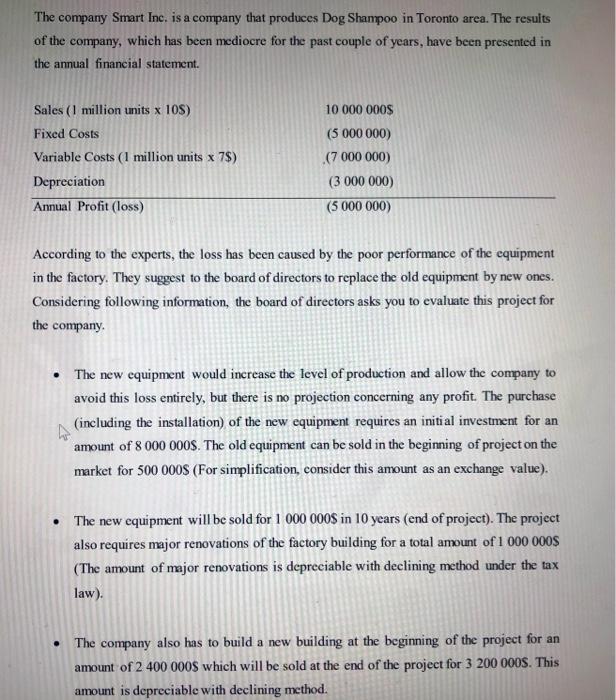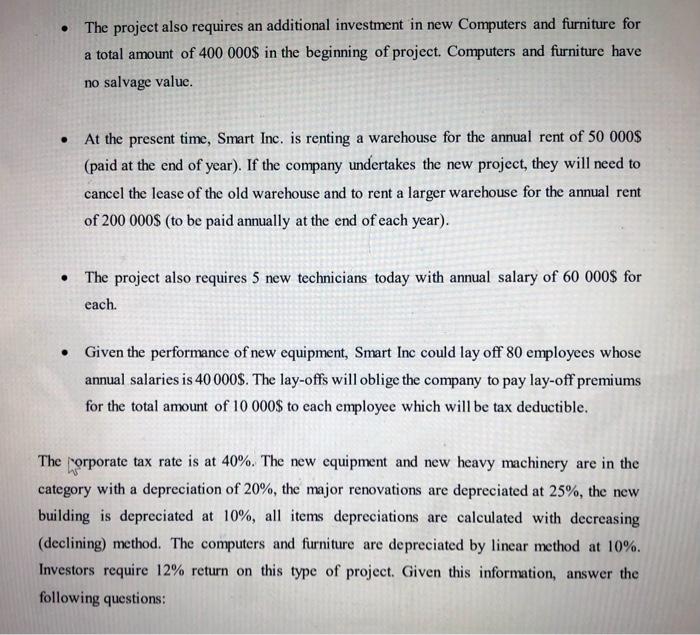The company Smart Inc. is a company that produces Dog Shampoo in Toronto area. The results of the company, which has been mediocre for the past couple of years, have been presented in the annual financial statement. 10 000 000$ Sales (1 million units x 108) Fixed Costs Variable Costs (1 million units x 7$) Depreciation Annual Profit (loss) (5 000 000) .(7 000 000) (3 000 000) (5 000 000) According to the experts, the loss has been caused by the poor performance of the equipment in the factory. They suggest to the board of directors to replace the old equipment by new ones. Considering following information, the board of directors asks you to evaluate this project for the company. The new equipment would increase the level of production and allow the company to avoid this loss entirely, but there is no projection concerning any profit. The purchase (including the installation) of the new equipment requires an initial investment for an amount of 8 000 000$. The old equipment can be sold in the beginning of project on the market for 500 000S (For simplification, consider this amount as an exchange value). The new equipment will be sold for 1 000 000$ in 10 years (end of project). The project also requires major renovations of the factory building for a total amount of 1 000 000$ (The amount of major renovations is depreciable with declining method under the tax law). . The company also has to build a new building at the beginning of the project for an amount of 2 400 000$ which will be sold at the end of the project for 3 200 000S. This amount is depreciable with declining method. The project also requires an additional investment in new Computers and furniture for a total amount of 400 000$ in the beginning of project. Computers and furniture have no salvage value. . At the present time, Smart Inc. is renting a warehouse for the annual rent of 50 000$ (paid at the end of year). If the company undertakes the new project, they will need to cancel the lease of the old warehouse and to rent a larger warehouse for the annual rent of 200 000$ (to be paid annually at the end of each year). The project also requires 5 new technicians today with annual salary of 60 000$ for each. Given the performance of new equipment, Smart Inc could lay off 80 employees whose annual salaries is 40 000$. The lay-offs will oblige the company to pay lay-off premiums for the total amount of 10 000$ to each employee which will be tax deductible. The Corporate tax rate is at 40%. The new equipment and new heavy machinery are in the category with a depreciation of 20%, the major renovations are depreciated at 25%, the new building is depreciated at 10%, all items depreciations are calculated with decreasing (declining) method. The computers and furniture are depreciated by linear method at 10%. Investors require 12% return on this type of project. Given this information, answer the following questions: 3. Identify ONE BY ONE and calculate separately the present value of each cash flow of the end of the project. 4. Calculate the Net Present Value of this project (You just have to add up your responses in 1, 2 and 3 for this one). 5. Calculate the Operational Cash Flow (OCF) of the 3rd year of this project. The company Smart Inc. is a company that produces Dog Shampoo in Toronto area. The results of the company, which has been mediocre for the past couple of years, have been presented in the annual financial statement. 10 000 000$ Sales (1 million units x 108) Fixed Costs Variable Costs (1 million units x 7$) Depreciation Annual Profit (loss) (5 000 000) .(7 000 000) (3 000 000) (5 000 000) According to the experts, the loss has been caused by the poor performance of the equipment in the factory. They suggest to the board of directors to replace the old equipment by new ones. Considering following information, the board of directors asks you to evaluate this project for the company. The new equipment would increase the level of production and allow the company to avoid this loss entirely, but there is no projection concerning any profit. The purchase (including the installation) of the new equipment requires an initial investment for an amount of 8 000 000$. The old equipment can be sold in the beginning of project on the market for 500 000S (For simplification, consider this amount as an exchange value). The new equipment will be sold for 1 000 000$ in 10 years (end of project). The project also requires major renovations of the factory building for a total amount of 1 000 000$ (The amount of major renovations is depreciable with declining method under the tax law). . The company also has to build a new building at the beginning of the project for an amount of 2 400 000$ which will be sold at the end of the project for 3 200 000S. This amount is depreciable with declining method. The project also requires an additional investment in new Computers and furniture for a total amount of 400 000$ in the beginning of project. Computers and furniture have no salvage value. . At the present time, Smart Inc. is renting a warehouse for the annual rent of 50 000$ (paid at the end of year). If the company undertakes the new project, they will need to cancel the lease of the old warehouse and to rent a larger warehouse for the annual rent of 200 000$ (to be paid annually at the end of each year). The project also requires 5 new technicians today with annual salary of 60 000$ for each. Given the performance of new equipment, Smart Inc could lay off 80 employees whose annual salaries is 40 000$. The lay-offs will oblige the company to pay lay-off premiums for the total amount of 10 000$ to each employee which will be tax deductible. The Corporate tax rate is at 40%. The new equipment and new heavy machinery are in the category with a depreciation of 20%, the major renovations are depreciated at 25%, the new building is depreciated at 10%, all items depreciations are calculated with decreasing (declining) method. The computers and furniture are depreciated by linear method at 10%. Investors require 12% return on this type of project. Given this information, answer the following questions: 3. Identify ONE BY ONE and calculate separately the present value of each cash flow of the end of the project. 4. Calculate the Net Present Value of this project (You just have to add up your responses in 1, 2 and 3 for this one). 5. Calculate the Operational Cash Flow (OCF) of the 3rd year of this project









